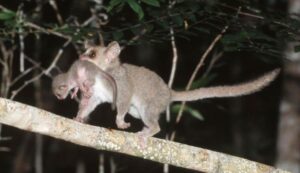Climate change threatens lemurs on Madagascar

Prof. Dr. Peter Kappeler, head of the Behavioral Ecology and Sociobiology Unit at the German Primate Center.
Photo: Claudia Fichtel / Deutsches Primatenzentrum
Even supposedly adaptable mammal species face increased risk of extinction.

Photo: Manfred Eberle / Deutsches Primatenzentrum
They are small, have a high reproductive output and live in the forests of Madagascar. During the 5-month rainy season, offspring are born and a fat pad is created to survive the cool dry season when food is scarce. But what happens when the rainy season becomes drier and the dry season warmer? Can mouse lemurs adapt to climate change thanks to their high reproductive output? Researchers from the German Primate Center – Leibniz Institute for Primate Research, together with colleagues from the University of Zurich, have analyzed long-term data from Madagascar and found that climate change is destabilizing mouse lemur populations and increasing their risk of extinction. The fact that climate change is leading to greater fluctuations in population density and thus increases extinction risk in a fast-paced, ecological generalist is an alarming warning signal for potential biodiversity losses in the tropics (PNAS).
Effects of climate change have mostly been studied in large, long-lived species with low reproductive output. Small mammals with high reproductive rates can usually adapt well to changing environmental conditions, so they have been little studied in the context of climate change. Claudia Fichtel and Peter Kappeler from the German Primate Center – Leibniz Institute for Primate Research (DPZ) have been researching lemurs on Madagascar for many years and have thus built up a unique data set to fill this knowledge gap.
Identifying trends with long-term data
Over a period of 26 years, from 1994 to 2020, Peter Kappeler and Claudia Fichtel studied the demographic structure of a mouse lemur population at the DPZ research station in Madagascar. Climate data from the same period show that the rainy season in this region became increasingly drier and the dry season increasingly warmer. They have now analyzed these data together with colleagues from the University of Zurich and found increasing mortality combined with rising reproductive rates. “These opposing trends have prevented a collapse of the mouse lemur population, but have nevertheless led to a destabilization of the population, as the already fast life cycle of the animals has been further accelerated,” says Claudia Fichtel.
Extinction risk increases
Fluctuating population sizes due to climate change pose a major threat to the animals, and could lead to extinction of the species. “Our results show that even an animal species that is supposedly able to adapt easily to changing environmental conditions thanks to a high reproductive rate is threatened in its survival by climate changes,” says Peter Kappeler. This is bad news, given that the lemurs that only occur in Madagascar are the world’s most endangered mammals. “In the future, data on the demographic stability of a population should also be included when classifying the risk of extinction of an animal species,” says Claudia Fichtel.
Wissenschaftliche Ansprechpartner:
Prof. Dr. Peter Kappeler
Tel.: +49 (0)551 3851-284
Email: pkappel@dpz.eu
Dr. Claudia Fichtel
Tel.: +49 (0)551 3851-467
Email: cfichtel@dpz.eu
Dr. Susanne Diederich (Public Relations)
Tel.: +49 (0) 551 3851-359
Email: sdiederich@dpz.eu
Originalpublikation:
Ozgul A, Fichtel C, Paniw M, Kappeler PM (2023) Destabilising effect of climate change on the persistence of a short-lived primate. Proceedings of the National Academy of Sciences USA, Vol. 120, DOI: 10.1073/pnas.2214244120, https://doi.org/10.1073/pnas.2214244120
Weitere Informationen:
https://www.dpz.eu/en/news/press-releases/single-view/news/klimawandel-bedroht-l… – Press release on DPZ homepage
https://medien.dpz.eu/pinaccess/pinaccess.do?pinCode=RHBenZIdpCev – Printable images
Media Contact
All latest news from the category: Ecology, The Environment and Conservation
This complex theme deals primarily with interactions between organisms and the environmental factors that impact them, but to a greater extent between individual inanimate environmental factors.
innovations-report offers informative reports and articles on topics such as climate protection, landscape conservation, ecological systems, wildlife and nature parks and ecosystem efficiency and balance.
Newest articles

Sea slugs inspire highly stretchable biomedical sensor
USC Viterbi School of Engineering researcher Hangbo Zhao presents findings on highly stretchable and customizable microneedles for application in fields including neuroscience, tissue engineering, and wearable bioelectronics. The revolution in…

Twisting and binding matter waves with photons in a cavity
Precisely measuring the energy states of individual atoms has been a historical challenge for physicists due to atomic recoil. When an atom interacts with a photon, the atom “recoils” in…

Nanotubes, nanoparticles, and antibodies detect tiny amounts of fentanyl
New sensor is six orders of magnitude more sensitive than the next best thing. A research team at Pitt led by Alexander Star, a chemistry professor in the Kenneth P. Dietrich…





















